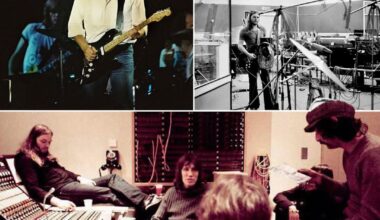The Beatles may have started with innocent odes to hand-holding, but they didn’t stay there for long. Within just a few years, they transformed pop music from simple love songs into a boundless artistic playground. Tracks like “I Am the Walrus” and “Helter Skelter” weren’t just hits—they were declarations. The band wasn’t interested in sticking to formula. They wanted to take music somewhere new.
This adventurous spirit didn’t just inspire fans—it challenged their fellow musicians. As Pink Floyd’s Roger Waters once said, albums like Sgt. Pepper’s Lonely Hearts Club Band and The Beach Boys’ Pet Sounds changed everything about how he thought music could be made. They weren’t just records—they were blueprints for new worlds.
From that influence, Pink Floyd built their own universe—one more expansive, surreal, and immersive than anything before. When The Dark Side of the Moon arrived in 1973, it wasn’t just an album—it was an experience. The band took the musical freedom The Beatles had cracked open and pushed it into a new dimension, blending philosophical themes with groundbreaking production. It was sonic escapism, a kind of journey that demanded you close your eyes and surrender to the sound.
Paul McCartney didn’t just notice—he admired it deeply. Reflecting on the album in his book The Lyrics: 1956 to the Present, McCartney said, “Pink Floyd made some great records in the 1970s… and it would have been natural for Wings to do something in their style. A lot of people did.”
The influence of Pink Floyd’s sound didn’t stop with the ’70s. Decades later, that same sense of sonic exploration echoed in Beck’s Grammy-winning Morning Phase. McCartney pointed out the similarity himself, saying, “It was very like a Floyd record… Pink Floyd’s world was almost an extraterrestrial world, so it was a nice place to go.”
Beck’s 2014 record was melancholic, textured, and deeply atmospheric—much like Floyd’s best work. But at its core, it still honored the structure of pop. That’s what made it so powerful. It wasn’t just experimental for the sake of being different. It was grounded, melodic, and emotionally rich—just like the best of McCartney, the best of Pink Floyd, and the best of The Beatles.
Even Johnny Cash once praised Beck’s ability to move between genres and emotions with ease, calling his song “Rowboat” something he might’ve written during his own darker days.
It’s this balance—between tradition and transformation, between grounded emotion and sonic experimentation—that connects The Beatles, Pink Floyd, and Beck. In their hands, music isn’t just something you listen to. It’s a place you go.





